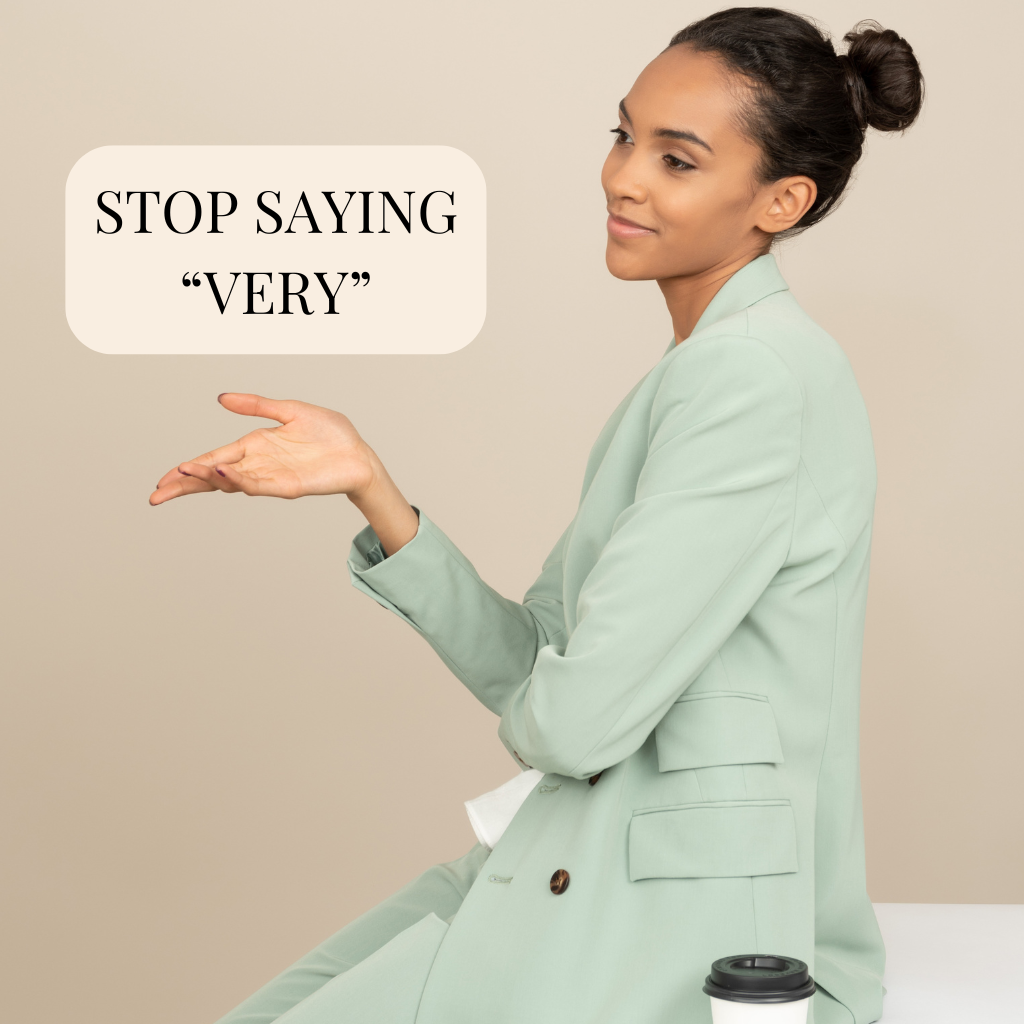

By eliminating “very” and opting for precise alternatives, you can elevate your business communication and convey your ideas with greater clarity and authority. I have to admit, I use the word “very” frequently, especially as English is my second language. But I’m trying to consciously reduce it by using alternative phrases instead.
In this post, I’ll explore various alternatives to “very” that will help you sound more powerful and professional. Familiarize yourself with these alternatives and use descriptive adjectives to become more creative and compelling in your conversations!
When you rely too much on the word “very,” it can make your speech and writing seem lazy and uninspired. This habit not only weakens your message but also makes you come across as less knowledgeable or less confident in your language skills. For professionals, this can impact how colleagues, clients, and superiors perceive your competence and authority.
Using more precise and vivid language enhances your communication, making your points clearer and more impactful. It shows that you have a strong command of the language and are thoughtful about how you express yourself.
Here are some powerful alternatives to “very” that you can incorporate into your speech and writing:
Instead of saying something is “very hard,” describe it as grueling, punishing, torturous, or demanding. For example:
If you feel “very tired,” you can say you are drained, exhausted, or fatigued. For example:
When you’re “very thirsty,” use parched. For example:
Replace “very happy” with thrilled, elated, or overjoyed. For example:
Instead of saying you are “very excited,” say you are eager, enthusiastic, or keen. For example:
When something is “very bad,” describe it as horrendous, awful, or atrocious. For example:
If the weather is “very hot,” use sweltering, scorching, or boiling. For example:
Replace “very cold” with freezing, frigid, or icy. For example:
Instead of saying you are “very nervous,” describe yourself as uneasy, anxious, or apprehensive. For example:

To illustrate how these alternatives can be used in context, here are some everyday sentences transformed with more powerful language:
In the context of an article titled “Alternatives to ‘Very’ for More Professional Communication,” you might find a link to a thesaurus or a writing resource particularly useful. Here’s an example sentence with an outbound link:
For a more extensive list of synonyms to elevate your professional language, consider using resources like the Thesaurus.
Changing your language habits takes practice and mindfulness. Here are some tips to help you make the switch:
Choosing more precise and descriptive language not only improves your communication skills but also enhances your personal and professional image. By avoiding the overuse of “very,” you’ll sound more intelligent, confident, and authoritative. So next time you find yourself about to say “very,” pause and choose a more powerful word instead.
Try using these alternatives to “very” in your next conversation or email. Share your experience in the comments below and let us know which words you found most effective. For more tips on mastering business etiquette and enhancing your personal brand, explore our online courses and digital etiquette eBooks. Sign up for a free consultation to learn how we can help you become the best version of yourself.
Take the first step towards improving your social and professional skills. Our free consultation will provide you with tailored advice and insights to help you achieve your goals. Don’t wait—book your session today and begin your transformation!
Kristina Szabova is a certified Etiquette Consultant and member of the International Association of Professional Etiquette Consultants.
Each book is packed with practical tips and expert advice. Perfect for those looking to refine their skills and elevate their everyday interactions.
Learn at your own pace with our online courses offer. Unlock your potential with expert-led training from the comfort of your home.
Achieve your goals with personalized one-on-one coaching. I’m here to support you every step of the way.
Shop our collection of stylish and functional products, including diaries, calendars, and tea sets.
| Cookie | Duration | Description |
|---|---|---|
| cookielawinfo-checkbox-analytics | 11 months | This cookie is set by GDPR Cookie Consent plugin. The cookie is used to store the user consent for the cookies in the category "Analytics". |
| cookielawinfo-checkbox-functional | 11 months | The cookie is set by GDPR cookie consent to record the user consent for the cookies in the category "Functional". |
| cookielawinfo-checkbox-necessary | 11 months | This cookie is set by GDPR Cookie Consent plugin. The cookies is used to store the user consent for the cookies in the category "Necessary". |
| cookielawinfo-checkbox-others | 11 months | This cookie is set by GDPR Cookie Consent plugin. The cookie is used to store the user consent for the cookies in the category "Other. |
| cookielawinfo-checkbox-performance | 11 months | This cookie is set by GDPR Cookie Consent plugin. The cookie is used to store the user consent for the cookies in the category "Performance". |
| viewed_cookie_policy | 11 months | The cookie is set by the GDPR Cookie Consent plugin and is used to store whether or not user has consented to the use of cookies. It does not store any personal data. |